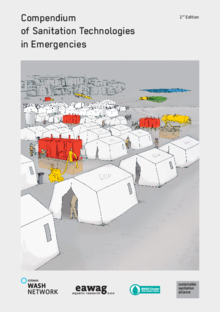Department Sanitation, Water and Solid Waste for Development
Water, Sanitation and Hygiene in Emergencies

Emergencies, be they natural or man-made disasters, and protracted crises have increased worldwide in the recent past. The provision of adequate WASH services at every step of a crisis, from the onset of an emergency to rehabilitation and long-term development, is crucial in order to ensure fundamental needs, protecting both humans and environmental health. The Strategic Environmental Sanitation Planning group (SESP) at Sandec is leading more than a dozen projects to support the humanitarian Water, Sanitation and Hygiene (WASH) sector. SESP serves as focal points for humanitarian backstopping requests reaching Sandec, coordinating and distributing the backstopping requests internally, ensuring close cooperation with other research groups at Sandec and Eawag.
One of the most well-known examples of Sandec’s contribution to the WASH sector is the Compendium of Sanitation Technologies in Emergencies, published in partnership with the German WASH Network and Swiss Humanitarian Aid (SDC/HA). Moreover, a Massive Open Online Course (MOOC) was launched in collaboration with the International Committee of the Red Cross (ICRC). Moreover, Sandec provides regular backstopping consultancies to SDC/HA and other humanitarian actors in terms of capacity building, advisory services and innovation.
The Compendium of Sanitation Technologies in Emergencies
The Compendium of Sanitation Technologies in Emergencies extends the scope of Sandec’s Compendium of Sanitation Systems and Technologies to the field of humanitarian aid. The document covers a wide array of technologies, applicable to the different phases of an emergency response. It provides an overview of the key cross-cutting issues that usually influence the selection of the most appropriate technology, providing support in the implementation phases in these contexts. It is a comprehensive, structured and user-friendly planning guide which supports and enables decision making by providing a framework for developing sanitation systems. It compiles a wide range of information on established technologies and gives a systematic overview of emerging sanitation technologies. In addition, it gives concise information on key decision criteria for the selection of a wide range of sanitation technologies. It facilitates the combination of technologies to come up with full sanitation system solutions, all linked to relevant cross-cutting issues. The compendium is currently available in English, French and Arabic. Find out more at: www.emergency-wash.org
Online version of the Compendium of Sanitation Technologies in Emergencies (Emersan Compendium)
The eCompendium is the online version of the Compendium of Sanitation Technologies in Emergencies. It is a decision support tool that allows real time filtering and configuration of entire sanitation service chain solutions in emergency settings. It provides detailed information on key decision criteria for all tried and tested emergency sanitation technologies, information on cross-cutting issues and available case studies, relevant to come up with informed sanitation technology decisions in emergencies.
Access the website here, and try it out today!
Development of Red Cross Red Crescent (RCRC) Faecal Sludge Management Capacities
The project aims to improve the environmental and public health impact of RCRC Emergency Response Units (ERU) and operation through upgraded green emergency sanitation solutions adherent to international quality standards. Eawag, in partnership with the Austrian Red Cross, the University of Natural Resources and Life Sciences, Vienna (BOKU) and the International Federation of Red Cross and Red Crescent Societies (IFRC) is currently developing a faecal sludge management unit that can easily be deployed to emergency contexts. The first trial of the unit will be taking place in Lebanon, where the project will be piloted for one year; ensuring capacity development through training of trainers for future RCRC ERU members worldwide.
Optimisation of faecal sludge transport in a camp
The camps in Cox’s Bazar district, Bangladesh, are home to over 600,000 people that fled violence in Myanmar. This research addresses the struggles with sanitation experienced by the approximately 27,000 inhabitants of the so-called Camp 18. This camp has a centralized faecal sludge treatment plant managed by the Bangladesh Red Crescent Society (BDRCS) and desludging teams which manually collect sludge from latrines in a part of the camp.
The research aimed to answer the primary question: To what extent can data collection with Global Navigation Satellite Systems (GNSS) and spatial decision support systems be utilized to optimise excreta management in Camp 18?
With GNSS data loggers attached to the faecal sludge transport barrels, we were able to obtain the service coverage of the desludging teams. This data was then used to model how faecal sludge transfer stations or an additional faecal sludge treatment plant might optimise this system.
To find out more, have a look at the Master thesis of Mélanie Droogleever Fortuyn.
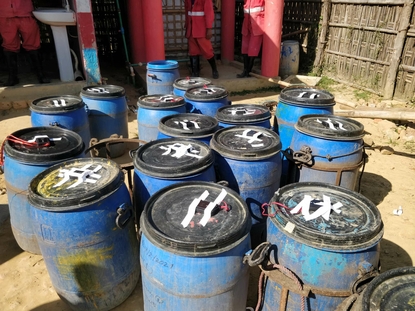
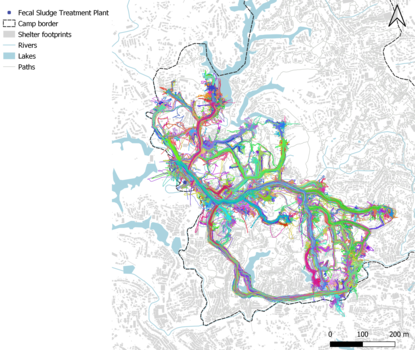
International Federation of the Red Cross – Country Support Platform (IFRC-CSP)
Cholera is an acute diarrhoeal infection and remains a global threat to public health and an indicator of inequity and lack of social development. Provision of safe water and sanitation is critical to prevent and control the transmission of cholera and other waterborne diseases.
In 2017, the Global Task Force for Cholera Control (GTFCC) launched the Global Roadmap to 2030, which aims to reduce the number of cholera deaths reported every year by 90 %. In 2019, Cholera-affected countries have called for additional technical support. In response, in 2020 the GTFCC has established a Country Support Platform (CSP) that is hosted by the International Federation of the Red Cross (IFRC).
Drawing on experiences from developing FACET, Eawag-Sandec collaborates with the CSP to develop a customised mobile data collection and analysis tool that allows rapid WASH assessments in cholera hotspots. This tool will serve as the basis to inform the WASH component of National Cholera Plans, to foster efficient resource allocation and promote advocacy.
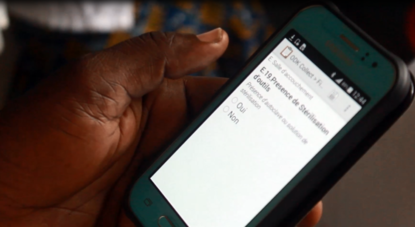
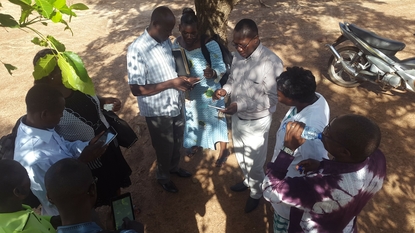
SANIHUB: The Humanitarian Sanitation Knowledge Hub

The SANIHUB is a comprehensive, co-created, structured and moderated knowledge and exchange platform. It brings together all available global knowledge on sanitation and Faecal Sludge Management (FSM) in emergencies on one single platform, serving as a first go-to-point, reference guide and as a constant companion for all those involved in planning and implementing sanitation and FSM interventions in emergencies. It also offers personal remote support for humanitarian WASH practitioners and local/national clusters via a helpdesk, supported by the GWC Technical Working Group on FSM.
This project was initiated by the Faecal Sludge Management Technical Working Group (FSM TWiG) of the Global WASH cluster and is implemented by a project consortium consisting of GTO, BORDA, CAWST, Eawag, IHE Delft, Netherlands Red Cross and Solidarités International over three years. The aim is to get access to safe, adequate and affordable sanitation and FSM services to people who are affected by crises.
Partners: BORDA, CAWST, Eawag, GTO, IHE Delft, Netherlands Red Cross and Solidarités International
Geneva Technical Hub
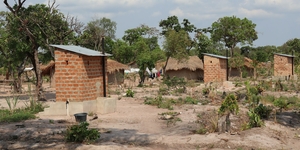
The recently established Geneva Technical Hub (GTH), co-convened by UNHCR and the Swiss Agency for Development and Cooperation (SDC/HA), aims at supporting UNHCR’ operations in solving complex technical issues and thus at contributing to improved response and service delivery. GTH works on request from field operations to provide practical and optimized context-specific technical solutions, accompanied with sound technical guidance and tools. It also aims at improving capacities of staff, in collaboration with Swiss academia in the areas of Disaster Risk Reduction, Water, Sanitation & Hygiene (WASH), Shelter, Settlement Planning, Energy, Environment and Protection.
In this context, SDC/HA provides support to the GTH by enabling backstopping from Eawag.
Currently, Eawag is supporting UNHCR with the development of technical guidelines and tools in the fields of sanitation and solid waste management. Eawag will support capacity building of UNHCR staff and partners, delivering state-of-the-art expertise to its field operations. It will also be documenting lessons learnt to contribute to the wider knowledge base within UNHCR, as well as in the wider global WASH community.
Faecal Sludge Laboratory – Department of Public Health Engineering, Cox´s Bazar
As part of the SHA backstopping mandate, SESP has been engaged in the planning and design of a faecal sludge laboratory for the district of Cox´s Bazar, Bangladesh. The Department of Public Health Engineering (DPHE) in Cox´s Bazar will operate the laboratory, which will provide analysis of liquid effluent of faecal sludge treatment plants in all of Cox´s Bazar district. The laboratory is staffed and equipped to analyse around 1000 samples per year, each for more than 10 parameters. Further training and education of DPHE´s laboratory staff by Eawag and external experts are ongoing.
Faecal Sludge Field Laboratory (FSFL)
Originally developed by Austrian Red Cross together with the University of Natural Resources and Life Sciences, Vienna (BOKU), with support of the Humanitarian Innovation Fund (HIF) by Elrha, the faecal sludge field laboratory marked a turning point for evidence-generation and accountability in humanitarian faecal sludge management. It enables humanitarian actors to assess the treatment performance of faecal sludge treatment plants for 25 parameters at every step of the treatment process, including influent and effluent characteristics. Eawag-Sandec (MEWS and SESP research groups) is further developing the field laboratory in close cooperation with Austrian Red Cross. Currently, FSFLs are in operation in three different countries, Bangladesh, Uganda and Germany.
Massive Open Online Course (MOOC)

The International Committee of the Red Cross (ICRC) and Eawag-Sandec have joined forces to develop a MOOC, entitled “Introduction to Public Health Engineering in Humanitarian Contexts”. The 5-week course has been launched in November 2017 in English with French and Spanish subtitles. The course can be attended any time on Coursera and YouTube for free.
Visit the MOOC on Coursera
Watch the Videos on YouTube

